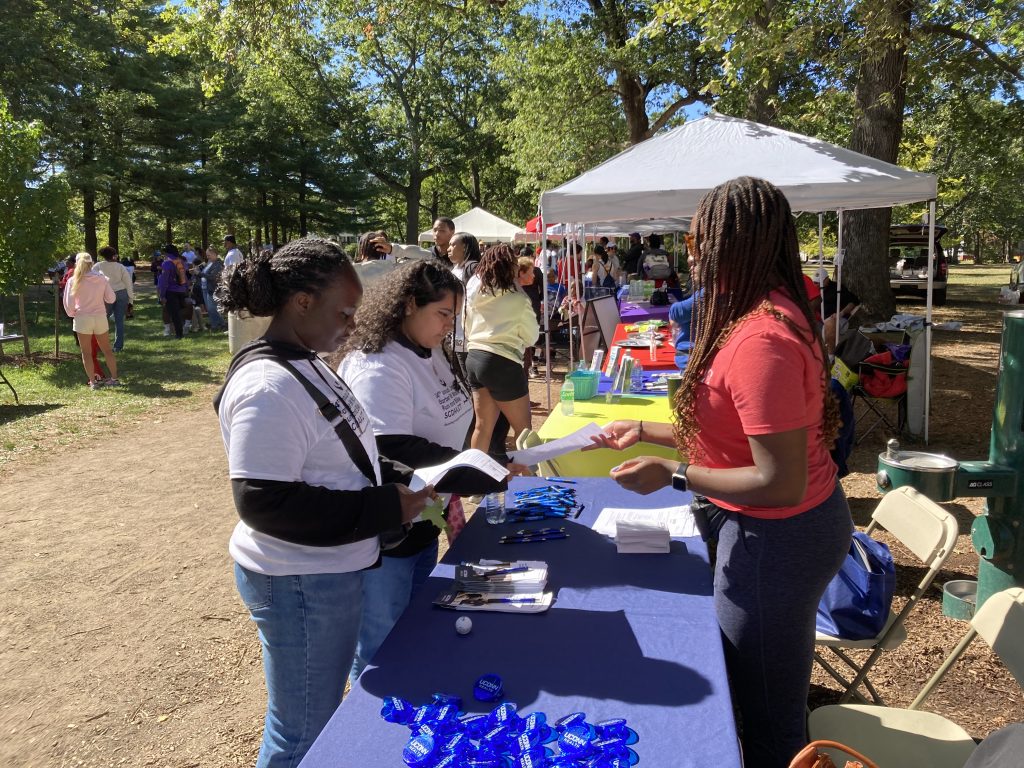On September 20, the New England Sickle Cell Institute and Connecticut Bleeding Disorders Center of UConn Health was at the Sickle Cell Disease Association of America, CT/ Michelle’s House Walk. Run. Bike. event in New Haven, Conn.

Zoe Green, clinical research assistant at the New England Sickle Cell Institute hosted an information table at the community event sharing more about the Institute and its community advisory board that helps advise sickle cell disease researchers. The community advisory board consists of volunteering patients, family members, and community advocates.
“Attending the SCDAA Walk. Run. Bike. event was very rewarding,” shared Green of UConn Health. “My favorite part of the event was getting a chance to connect with different members of the community who share the same goal as us in raising awareness of sickle cell disease.”
All year round the Institute team tirelessly works to identify more and more sickle cell patients in the surrounding communities to help them better manage their painful inherited red blood cell condition, their health, reduce their pain symptoms and disease complication risks, and to keep them out of the hospital so they could enjoy their lives more.
Green adds, “This event and others we participate in are very important in our clinical and research efforts. Getting a chance to talk to members of the community allows us to provide information on the work we are doing and explain how what we do helps to improve the quality of life for individuals affected by sickle cell disease.”

It has been an exciting year for the Institute. In January it opened a new state-of-the-art 12,840 sq. ft. outpatient care space at UConn John Dempsey Hospital. The Institute now brings the latest innovative care, medications, supportive services, and clinical trials to its patients all in one space. The new space also marks a formal beginning of a joint home for the care of individuals with sickle cell disease and inherited bleeding disorders.
Together, the Institute’s two programs at UConn Health provide care for patients from all over Connecticut and serve as both a regional and national referral base from physicians across many disciplines, including other hematologists. The Institute, founded in 2009, has served the majority of adult sickle cell patients in the state. UConn Health’s Bleeding Disorders Center is one of the longest-running specialty clinical programs in the institution’s history. In fact, it has long been recognized as a premier center for the care of patients with hemophilia and other bleeding disorders and one of only two adult bleeding disorder programs in the state.
In 2009, founder and director Dr. Biree Andemariam first established the New England Sickle Cell Institute at UConn Health after witnessing first-hand the health care disparities experienced by sickle cell disease patients. The Institute is the first and only dedicated outpatient regional center of its kind for managing the painful inherited red blood cell condition to help adults combat the daily suffering associated with sickle cell disease and improve their overall quality of life. The once small sickle cell disease program has grown to serve the Institute’s hundreds of patients and has a national referral base. Plus, the Institute’s global collaborations have published evidence-based, best practice guidelines, and the research team is conducting clinical trial testing for promising experimental drugs aimed at reducing the disease’s trademark cell sickling, blood vessel blockages, organ damage, frequent hospitalizations, and premature deaths. Plus, the Institute continues to train and educate the next generation of health care providers for sickle cell and bleeding disorders.



